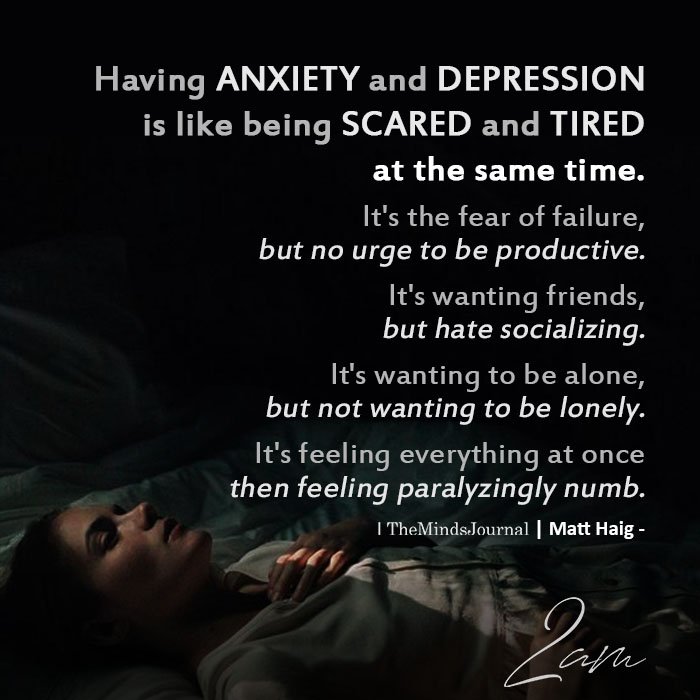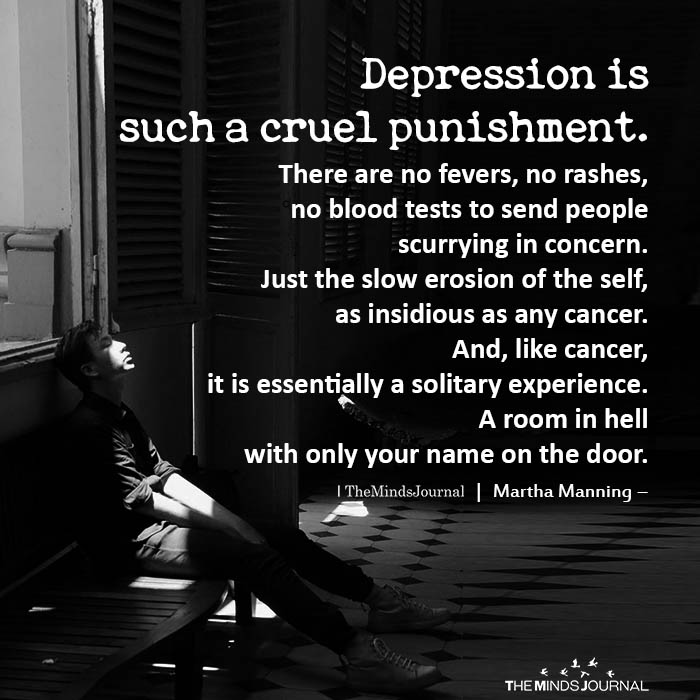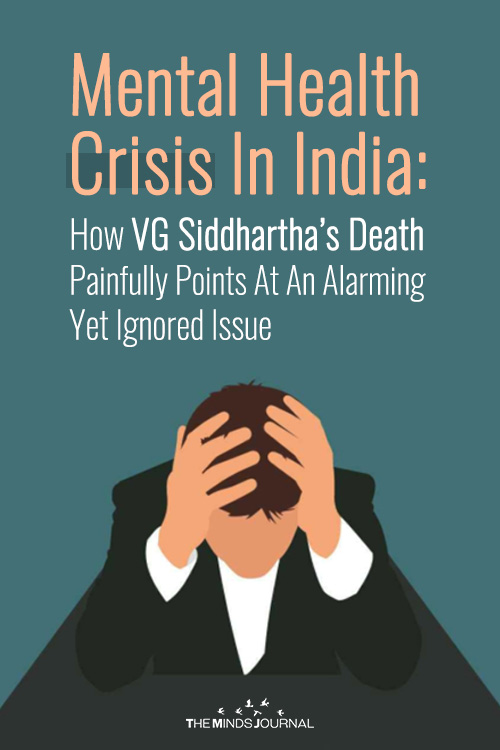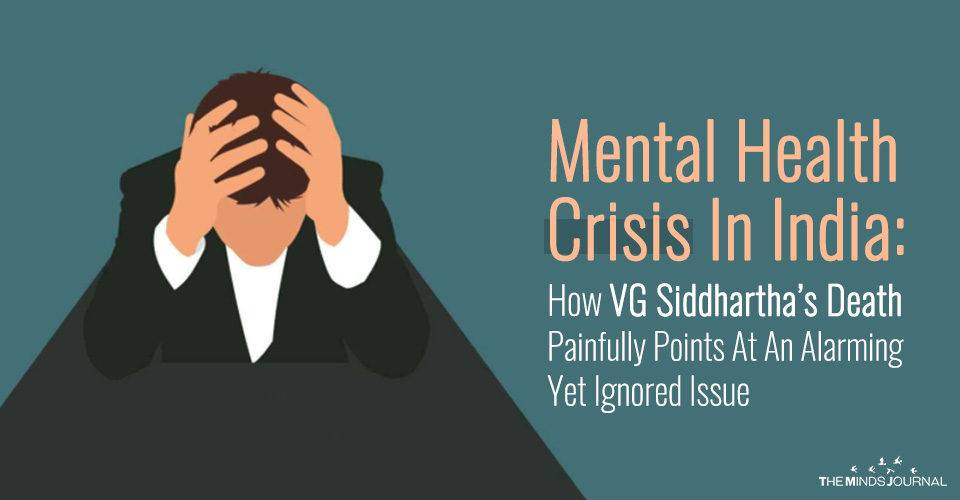Alarming Mental Health Crisis In India
What drives a person to take his own life? What makes a successful entrepreneur to commit suicide? Is it just the money? No. There is a much darker side to anxiety and depression that can force anyone to take the extreme step.
“I have failed as an entrepreneur. This is my sincere submission, I hope someday you will understand, forgive and pardon me,”
– VG Siddhartha, the founder of CCD (Cafe Coffee Day), the popular coffee chain allegedly said in a letter he sent to the board of directors and employees.
The purported note and the tragic suicide of Siddhartha once again brings the focus back on mental health and the lack of understanding about the importance of mental well-being. In India, the statistics related to suicide is alarming with at least one student committing suicide every hour. Moreover, there is one suicide attempt made by someone every 3 seconds in India. The untimely death of the CCD founder now proves that it is high time that we take notice, remove the stigma around mental illness and spread awareness on the importance of mental health for our survival.

RIP VG Siddhartha
Indian coffee tycoon VG Siddhartha was reported to be missing on 29th July, 2019. Reports said that Siddhartha left his car near the Nethravati River, Mangaluru, Karnataka with his driver still in the car. After he was gone for over an hour, his driver panicked and called the police over his mysterious disappearance. Sadly, his deceased body was found by fishermen in the early morning of 31st July after an intense search. The police now claims that Siddhartha committed suicide due to financial pressure and depression.
In a letter believed to be written by the CCD founder on 27th July, he apologised to the stakeholders, the board and the employees. The letter clearly points to the struggles he faced both financially and mentally. It is reported that he had a massive personal loan amounting to INR 1,000 crore. The letter stated –
“After 37 years, with a strong commitment to hard work, having directly created 30,000 jobs in our companies and their subsidiaries, as well as another 20,000 jobs in a technology company where I have been a large shareholder since its founding, I have failed to create the right profitable business model despite my best efforts.”
His note read –
“I would like to say I gave it my all. I am very sorry to let down all the people that put their trust in me. I fought for a long time but today I gave up as I could not take any more pressure…”

This is not an isolated incident. Unfortunately.
The current statistics on suicide rates in India clearly show that the tragic death of Siddhartha is not a one-off case. According to the British Journal The Lancet,
“Suicides in India are a public health tragedy in need of a plan”.
Over the past few years several seemingly successful entrepreneurs have taken their own lives due to anxiety and depression, driven by the failure of their business ventures.
- Last month it was reported that due to financial losses, a steel merchant from Matunga committed suicide.
- A textile business owner from Kandivali East, Mumbai chose to end his life by jumping from his high-rise apartment.
- Another businessman trading in gold committed suicide back in 2018 due to increasing debts.
- Vineet Whig, COO of South Asia at Encyclopedia Britannica, committed suicide in 2016 by jumping from the 19th floor of a building in Gurugram. His suicide note mentioned that he was “fed up” with life and was highly stressed.
- In the same year, founder of KQingdom Ites, Noida based techie Lucky Gupta Agarwal took his own life after his ambitious new app proved to be a disaster.
- Lalit Sheth, founder of a leisure travel company, committed suicide in 2012 due to debts by jumping from the Bandra-Worli Sea Link.
- In 2016, CEO of Caparo Industries, Angad Paul, ended his life in London after his company faced hurdles and numerous jobs were lost. It is reported that he was suffering from depression.
- In June 2019, NRI businessman Sajan Parayil ended his own life in Kannur, Kerala after he failed to obtain a license to start a new convention centre from his savings for the villagers.
Sadly, that’s not all. In the present economic situation, CEOs, MDs, entrepreneurs and top-level managers are more prone to anxiety and depression due to various financial and business-related pressures. Hence, these individuals are more susceptible to mental illness.
From farmers, businessmen, celebrities and students to every single individual in the country can experience depression and start having suicidal thoughts resulting in tragic and untimely deaths. The statistics of suicides in India is simply too monumental for us to ignore the impact of mental health in our lives and the lives of our loved ones.

The great Indian mental health crisis
We are facing a serious mental health crisis here. VG Siddhartha’s suicide once again put the spotlight on depression and suicidal tendencies even in entrepreneurs and celebrities, not just poor farmers. Around 800,000 people commit suicide globally every year and among them about 135,000 individuals are Indian residents. According to the 2018 The Lancet Public Health report, India accounts for over one fourth of global annual male suicides and around one third of annual female suicides. In 2016, 130,000 people took their own lives in India, as per the National Crime Records Bureau.
These are not just statistics. These were real people with families who chose death over life. But why? Beyond the economic and social reasons, the primary reason for this catastrophe is the issue of mental illness, which mostly goes ignored by us. The Lancet Public Health states
“Although there are substantially more suicide deaths in India each year…suicide prevention has attracted considerably less public health attention.”
In a recent report from CNN-News18, Psychiatrist and director of the Department of Mental Health and Behavioral Sciences at Fortis Healthcare, Dr Samir Parikh, said
“We need to appreciate that today suicide has become one of the top killers in the world, most people have ongoing psychological issues though this may not always been a case.”
He added –
“All human beings are equally vulnerable. Everyone has their own struggles.”
Dr Nimesh Desai, Director at IHBASI (Institute of Human Behaviour and Allied Sciences), believes that suicidal tendencies and behavior primarily occurs due to depression. Depression can often go unnoticed by family and friends as it can be easy to hide what a person is truly feeling when suffering from mental health problems. This is why early identification and stronger focus on solving the real problem is essential.
But can’t mental illness patients get any help? Yes! But at the cost of being labelled as a ‘psycho’.
Read 12 Common Mental Illness Signs You Should Never Ignore
Seeking help is harder than we think

The real danger related to anxiety and depression is perhaps the taboo surrounded with mental health issues in India which prevents innumerable people from seeking help and get proper treatment. Avoiding mental health issues leads to serious implications which can further result in suicide. This is a serious factor that we must consider, believes Neurologist Dr Sonia Lal Gupta. She says –
“People need to understand any mental ailment is because of a chemical imbalance like another medical problem, for example, in diabetes it is due to an imbalance of insulin.”
Dr Samir Parikh shares a similar perspective. He states-
“Corporate India needs to see mental health outcomes. Often those in leadership roles will not talk about it and not seek help. Reaching out is important.”
He claims that over 90% of individuals who attempt suicide suffer from some form of untreated mental health problems. In a report from Moneycontrol, Dr Parikh added –
“There are proximal and distal factors that come into the picture. Distal factors means that the individual has been suffering for a long time. Later, when a trigger occurs that makes them take a wrong step.”
According to the World Health Organisation, 1 out of 20 people are coping with depression in India currently. Although suicide is an extreme measure, these patients are dying inside their minds slowly and silently every single day.
This is where the Indian Government needs to step in and take measures to spread awareness about mental health crisis and provide adequate treatment opportunities for patients without getting judged. Dr Sonia Lal Gupta says –
…the government “needs to increase the budget on mental health. Currently, it is a very small part of health. It also needs to increase awareness and run programs about the same so people know it’s ok to have issues like anxiety and depression and also understand how common it is. It is also very important that doctors from all specialties start screening patients for depression so that it can be recognized and treated in time.”
India is suffering…internally

From intellectual disability and autism to substance abuse, anxiety and depression and psychosis, India is in serious need of a mental health revolution. The Indian population is among the largest in the world suffering from some type of mental illness disorder, according to the World Health Organization (WHO). A recent survey conducted by the National Mental Health program found that around 15 crores Indians need mental health treatment. And among them 70-92%of patients are unable to access treatment. That is a seriously staggering number for anyone to ignore.
This is the time for specialists, experts, survivors and mental health warriors to come forward and talk about mental disorders. By sharing their stories and learning, others like them can be inspired to seek help while there is still time. But more than that what is actually needed is a shift in the culture and mindset regarding mental illness and treatment.
The only question that matters: WHY?
When we can instantly run to our nearest hospital for any physical illness, shop for medicines like shopping for new clothes to check our diabetes and cholesterol, then why are we so hesitant to seek treatment for mental illness? Why do we feel so shy to tell someone about our mental disorders? Why are mental illness patients judged for seeking help and labeled as “psychopaths” and “lunatics”? Why is our mental well-being any less important than our physical well-being? WHY?
As a society we need to start by focusing on a number of factors if we are to address this issue –
- Lack of skilled mental health professionals & facilities
- Lack of awareness of mental illness symptoms
- Lack of faith in treatment
- Lack of compliance with psychiatric treatment
- Lack of awareness about relapse
- Stigma associated psychiatric treatment
- Insufficient funding & low priority of healthcare budget
- Thinking mental disorders as a sign of weakness
Simply making new policies will not help people suffering from mental illness nor will it stop depressed people like VG Siddhartha from taking their own lives and leaving their families to grieve their untimely deaths.
This has to stop NOW!

In 2011, the World Health Organisation found that for every 100,000 mental illness patients, there were only 0·047 psychologists and 0·301 psychiatrists. The government has also failed to take the right steps and has only made empty promises regarding this issue. Did you know that a mere 0.06% of the health budget in India is allocated to mental health? This shocking fact was released the Human Right Watch.
To overcome this current scenario, there are certain things that we need to get started with immediately, like:
- Taking this mental health crisis seriously
- Motivating patients to seek professional help
- Spreading awareness that mental illness is an actual medical condition
- Making help readily available and accessible in a cost-effective manner
- Conducting free mental checkup camps by professionals and experts
- Talking about the benefits of psychotherapy
- Making self-treatment, research and help easily available through proper online modes
This is where The Minds Journal comes in.
The Minds Journal is an online mental and emotional wellness platform that aims to close the gap between mental disorders and professional therapy through various online channels. We plan to connect individuals hesitant to seek help with helplines, psychiatrists, psychologists, life coaches, and other experts.
What we aim to achieve
The fact is over 80% of Indian residents hesitate to seek any treatment when it comes to mental disorders. This why we need to focus on psychological, medical and social interventions to help those who are reluctant to ask for any help. Moreover there is a serious shortage of mental healthcare professionals in the country.
However, what is more important is that we end the stigma, ignorance, lack of awareness and apathy related to mental illness in India immediately. This is leading to isolation, shame and further suffering in the patients. And this can only be done by empowering those suffering from different mental health problems.
Moreover, schools, colleges and companies should also take the right measures to make sure their pupils and employees are not facing any mental health issues and if they are, they can readily access treatment even without asking, if needed. Evaluation of every individual, from the janitors, students and employees to the principals and the CEO, should be made mandatory at an interval of every 3 months. A strict annual health program which will also focus on mental health crisis, should be made compulsory in every educational institute and business organisation. The management should also encourage people to express their thoughts and emotions openly and privately without the fear of being judged or shamed.
What we have to offer
Today, there is a strong need for a platform like The Minds Journal that can empower individuals suffering from mental disorders to connect with each other and develop supportive network. We wish to help them help each other and prevent one another from feeling isolated, alone or alienated. By sharing their thoughts and feelings with each other, we want to enable mental health patients to seek professional help.
The human mind is the most powerful weapon.
We have successfully developed a global platform where writers and readers share thoughts on mental health and promote self development & better living. As our thoughts drive our actions, our mindset can actually alter our entire perception about others & ourselves and what we do in our lives. This is why we are dedicated to cater to every small thought that lingers in our minds and can affect our lives. Our online platform allows different minds facing different challenges and overcoming different obstacles to share their views and perceptions about life to motivate others in similar situations.
We have achieved this by offering unique, high quality, informative, honest and helpful Articles, Blogs, Stories, Poetry, Quotes, Thoughts, Photos and Videos. Our writers, readers and contributors come from different backgrounds who want to learn, teach, improve themselves, help and inspire others who need help.
The Minds Journal is gearing up to provide effective and empathic therapy and counselling services online like self help tools, community support, online assistance and offline solutions. We aim to approach schools, colleges and large and mid-sized businesses individually with a range of effective and smartly designed solutions. The goal is to educate and train our society about the urgent need for psychiatric treatment intervention. We believe smart and prompt intervention can actually help to save a life.
The problems we need to address
In our journey to help people suffering from mental illness live with confidence and dignity, we have identified a few key issues that need to be addressed immediately:
Mental Stress
- Loss in productivity
- Disturbed academic/professional life
- Health issues
- Anxiety
- Anger management issues
Toxic Home Environment
- Domestic violence
- Emotional/sexual abuse in children and women
- Bases for toxic relationship
Depression
- Suicidal tendencies
- OCD
- Social media addiction
- Substance Abuse
- Loss of purpose in life
- Pessimistic view in life
Negative Outlook Towards Life
- False perception of happiness
- Substance abuse
- Established pessimism
- Disruptive behaviours
Parenting Issues
- Reduced Transparency
- Poor Communication
- Lack of proper guidance
- Unaddressed cyber/emotional bullying
Substance Abuse
- Memory Loss
- Neurological disorder
- Hampered social life
- Mood swings
What needs to be done
With our years of expertise in dealing with mental health problems and looking for easily accessible cost-effective solutions, our team of experts have managed to point out the most effective solutions that can help to bring about a mental health revolution in India:
- Identify mental health issues in individuals
- Curbing Social Media Addiction
- Promote overall emotional well-being
- Anonymous discrete counseling and therapy sessions
- Easy accessibility to helplines, online & offline expert consultation
- Human Behavior Modification
- Improving access to better mental healthcare
- Mental health care assistance in educational institutes and corporate
- Spreading mental health awareness by removing stigma, discrimination and prejudice
- Intervening substance dependence (drugs, alcohol, other substances)
- Providing Guidance (parental & moral guidance)
How we can help solve this mental health crisis
By closely analyzing and identifying the underlying problems India is facing regarding mental health and treatment, we are designing a range of helpful services after much deliberation:
Self Help Tools
- Helpful Articles & Blogs
- Questionnaires
- Psychological Assessment
- Motivational Videos
Community Support
- Open forum for discussion
- Support Groups
- Questionnaires
- Access to Mental Health Manuals written by Experts
Online Assistance
- Online Expert Consultation
- Online discrete counseling
- Questionnaires
- One-on-one video conference
Offline Services
- Helping people connect with mental health professionals in their location
- Face to face Counselling & Therapy sessions
- Provide mental healthcare to educational institutes and Corporate bodies
- Conducting Regular Mental Health Seminars across the world
Redefining Mental Health in India
The Minds Journal is dedicated to connect individuals suffering from mental ailments through our online platform to create a network that would help them to find the courage and the motivation to fight back. We also aim to offer instant, safe and easy access to effective treatment to people experiencing mental disorders.
Our advanced online platform will not only promote mental health awareness and mindful living, but it will also offer professional help on various mental health topics.
If you want to know more or if you are looking for some help, feel free to visit TheMindsJournal.com.











Leave a Reply